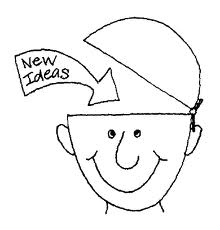Why An Open Mind is the Way to World Peace
 My father taught me many wonderful things, mostly by example, which is the best way to learn. One of the things I most admire about him was that he had a very open mind and respected differing viewpoints.
My father taught me many wonderful things, mostly by example, which is the best way to learn. One of the things I most admire about him was that he had a very open mind and respected differing viewpoints.
That is refreshing in this day and age when people are quick to “unfriend” people who don’t see things the way they do.
I recall the time my father was at a football game sitting in front of someone rooting for the opposing team. His friend asked why he wasn’t upset about it and my father’s response was simply, “Well, that’s what makes a horse race.”
When I joined a cult in the 1970s, my father maintained a very open, wait and see attitude before judging me and my guru. He and my mother came to hear my teacher speak and to learn more about what I was involved in. I really didn’t know many parents who were doing that at that time.
In fact, my father told me about a conversation he had with someone critical of my guru:
Dad: Have you gone to hear him speak?
Critic: No
Dad: Have you spoken with members of his group?
Critic: No
Dad: Oh, so you’re an expert!
Dad never hesitated to call it like he saw it.
An open mind travels, too
In 2008, Actor Matt Damon said, “I think many of our problems as a country would be solved if people had thick passports.”
Today, just 30% of American citizens have passports. It’s a shame, because traveling to other cultures is one of the best educational experiences I’ve ever had.
And I’ve always been very humbled by how much my European and Australian friends know about American politics while we know almost nothing about theirs.
Perhaps if we traveled more to other countries and got to see that they are filled with human beings with dreams and hopes just like ours, there would be more global understanding and tolerance.
I don’t believe watching the news gives us the complete picture. It usually focuses on protestors while ignoring the vast majority of citizens who are peacefully going about their lives.
Differing viewpoints can be the spice of life. Respect for different opinions can lead the way to peace. If the Europeans who conquered this country had even a little respect for the lifestyle and spiritual beliefs of the original people who lived here, perhaps the U.S wouldn’t be destroying the earth in the name of progress.
A cultural exchange opportunity missed
I thought of all this when I came across this speech given by Onondaga Chief Canasatego in Pennsylvania in 1744. Representing the Iroquois Confederacy of Nations, Chief Canasatego was replying to the Colony’s offer to educate Native men.
“We know you highly esteem the kind of learning taught in these colleges. And the maintenance of our young men, while with you, would be very expensive to you.
“We’re convinced, therefore, that you mean to do us good by your proposal, and we thank you heartily.
“But you who are so wise must know that different nations have different conceptions of things. And you will not, therefore, take it amiss if our ideas of this kind of education happens not to be the same with yours.
“We have had some experience of it.
“Several of our young people were formerly brought up in the colleges of the northern province. They were instructed in all your sciences.
“But when they came back to us, they were bad runners, ignorant of every means of living in the woods, unable to bear either cold or hunger, knew neither how to build a cabin, take a deer, or kill an enemy, spoke our language imperfectly, and therefore were neither fit for hunters nor warriors nor councilors. They were totally good for nothing.
“We are, however, not the less obliged for your kind offer, though we decline accepting. To show our grateful sense of it, if the gentlemen of Virginia will send us a dozen of their sons, we would take great care in their education, instruct them in all we know, and make men of them.”
I don’t believe the “gentlemen of Virginia” took Canastego up on his offer. But if they had, and such education exchanges had become commonplace, we’d be living in a very different world today.
Taking time to get to know other cultures and ways of viewing the world is probably one of the best ways to unite our planet. It’s never too late. How can you start?
If you enjoyed this post, I’d be thrilled if you’d comment and/or click one of the buttons below.
Molly Larkin is the co-author of the international best-seller “The Wind Is My Mother; The Life and Teachings of a Native American Shaman” and other books on health. She is passionate about helping people live life to their fullest potential through her classes, healing practice and blog at www.MollyLarkin.com

